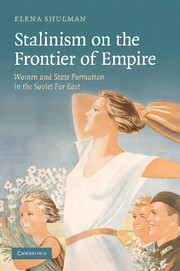Book contents
- Frontmatter
- Contents
- List of illustrations
- Acknowledgments
- Glossary
- Note on the text
- Introduction
- 1 Women and Soviet power
- 2 “Where steel cracks like glass”
- 3 “Our famous Valia”: the rise of a Soviet notable
- 4 “Envy for everything heroic”: women volunteering for the frontier
- 5 “Bol'shevichki were never ascetics!”: female morale and Communist morality
- 6 Snivelers and patriots
- Conclusion
- Appendices
- Selected bibliography
- Index
3 - “Our famous Valia”: the rise of a Soviet notable
Published online by Cambridge University Press: 19 July 2009
- Frontmatter
- Contents
- List of illustrations
- Acknowledgments
- Glossary
- Note on the text
- Introduction
- 1 Women and Soviet power
- 2 “Where steel cracks like glass”
- 3 “Our famous Valia”: the rise of a Soviet notable
- 4 “Envy for everything heroic”: women volunteering for the frontier
- 5 “Bol'shevichki were never ascetics!”: female morale and Communist morality
- 6 Snivelers and patriots
- Conclusion
- Appendices
- Selected bibliography
- Index
Summary
Magical landscapes needed pioneering men and women like Valentina Khetagurova. Evgenii Petrov (the famous writer and journalist of the Ilf and Petrov fame) assisted in the manufacture of Khetagurova as a representative of frontier heroism and a Soviet celebrity, having met her while on tour in the Far East in 1937. His article extolling her virtues simultaneously applauded her abilities to resist becoming “dizzy” from the “huge and deafening fame” and reinforced her notoriety by comparing her to famous Western movie stars. According to Petrov, Khetagurova's capacity to handle fame exemplified a general ability of “our” young people not to let “popularity ruin them.” This resilience was “understandable” in a generation that had grown up for twenty years under Soviet power to become “spiritually pure and unspoiled.” In other countries, Petrov opined, “Any kind of movie star celebrity would immediately mean furs, diamonds, personal yachts and villas – the noses of those women instinctively turn up to the sky, the eyes squint, as though the famous one has become nearsighted, her walk loosens.” Khetagurova, by contrast, seemed to carry her fame with the “dignity of a philosopher. This is not an act. There's not the slightest hint of posing.” Although on the inside, Petrov assumed, she enjoyed her popularity, “You would not notice this on the outside. It is difficult to retain mental equilibrium, when a person experiences fame. It is even harder not to display real or imagined superiority. This is evidence of great tact”.
- Type
- Chapter
- Information
- Stalinism on the Frontier of EmpireWomen and State Formation in the Soviet Far East, pp. 85 - 118Publisher: Cambridge University PressPrint publication year: 2008

